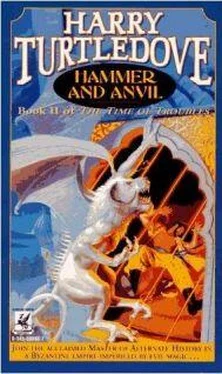As Maniakes peered out through the filigree grillwork that gave Avtokrators and their families privacy when they cared to have it, he saw one of the blue-robed priests who had greeted him hurry down the aisle and speak to Agathios, who was standing by the altar in the center of the temple.
Agathios heard him out, then nodded. His gaze went to the grill. From times when he had worshiped in the public area of the High Temple, Maniakes knew he was effectively invisible behind it. All the same, for a moment he and the patriarch seemed to lock eyes.
Then Agathios looked away from him and up toward the great dome that was the architectural centerpiece of the High Temple. Maniakes' eyes traveled up to the dome, too, and to the mosaic of Phos in stern judgment covering its inner surface. The good god's eyes seemed to look into his, as they would have had he been anywhere in the High Temple. The Phos in the dome there was the model for depictions of the good god in temples throughout the Empire. Some of the provincial imitations looked even fiercer than the original, but none could approach it for awe-inspiring majesty. You would have to think twice before contemplating sin under that gaze.
Try as he would, though, Maniakes had trouble seeing the desire to marry his cousin as something for which the lord with the great and good mind would condemn him to the eternal ice. In his time on the throne, he had seen the difference between rules in place because they made sense and those in place because they were in place. He reckoned the prohibition that so exercised Agathios one of the latter.
The patriarch kept looking up into the dome. His back was straighter when at last he gave his attention to the growing number of worshipers filing into the pews that led up to the altar. Presently Maniakes heard and felt priests shutting the doors down below him.
Agathios lifted up his hands. The congregants rose. Behind the filigree screen, Maniakes stood with everyone else, though no one except that Phos brooding in righteousness could have seen him had he stayed seated. Along with the rest of the worshipers, he followed the patriarch's lead in reciting Phos' creed, then sat once more as a chorus of priests sang the good god's praises. Going through the infinitely familiar liturgy, rising and sitting, praying and chanting, cleansed Maniakes' spirit of some of the worry with which he had entered the High Temple. It served to unite him to the good god and also to unite the people of the Empire with one another. Wherever Videssos' dominions ran, men and women prayed in the same way and acknowledged the same clerical hierarchy. A schism would shatter that unity hardly less than the Makuraner occupation of the westlands had.
Following Agathios' lead, the worshipers stood for a last time, repeated Phos' creed, and then sat back down to hear the ecumenical patriarch's sermon. That, of course, varied from day to day, from week to week, and from temple to temple. Maniakes leaned forward and put his ear close to the grillwork so as to miss nothing. It was principally for the sermon he had come, not for the liturgy, comforting though that was.
"May the lord with the great and good mind look down kindly upon Videssos and ensure that we pass through the present crisis unharmed," Agathios said. Small murmurs of "So may it be" floated up to Maniakes from the pews; a good half the congregants sketched the sun-circle over their hearts. Maniakes traced a quick sun-circle himself.
The patriarch went on, "May the lord with the great and good mind also instill piety and wisdom into the heart of the Avtokrator. The course he presently contemplates would make it difficult for Phos to grant his blessings to him in particular and to the Empire as a whole. While I grieve with his Majesty and sympathize with the loneliness now engulfing him, I must respectfully remind you all that the laws of the temples are not a bill of fare at an eatery, wherefrom a man may choose those courses pleasing to him while paying no heed to the rest. They form a seamless garment, which will fall to rags if any one of them be torn from it."
He looked up toward the grillwork behind which Maniakes sat. "The Avtokrator is of course Phos' viceregent on earth, and heads the Empire consecrated to the good god's true and holy faith. He is at the same time a man, far from being the good god's son or any other such outlandish notion, and is subject to the same fleshly temptations as other men. Such temptations are lures of Skotos, to be resisted with all the power a man shall have."
Agathios went on in that vein for some time. He was polite, reasonable; he did not shout about incest or urge the people of Videssos either to rise against their Avtokrator or risk the imperilment of their souls. As Maniakes had seen, Agathios enjoyed being patriarch and wanted to hold the job. He was giving Maniakes as little excuse to oust him as he could-but he also was not retreating from the position he had set forth in the imperial residence.
It was, in its own way, a masterful performance. In the abstract, Maniakes admired it. He was, however, not much given to abstraction at the moment.
As Agathios dismissed the congregants from the liturgy, Maniakes rose from his seat and left the private imperial box. The guards nodded to him as he came out. One asked, "Did the sermon please you, your Majesty?"
He didn't mean anything by it: by his tone, it was just a question for the sake of casual conversation. But it was not the question Maniakes wanted to hear then. "No," he snapped.
"Will you sack him then, your Majesty?" the guard asked eagerly. The eyes of all his companions lit up. Doctrinal controversy was meat and drink to anyone who lived in Videssos the city.
"I hope not," Maniakes answered, visibly disappointing the soldiers. They were still trying to get more out of him when he left the temple and came out to where the Halogai waited.
The northerners found Videssian theological squabbles inordinately complex.
"This stupid priest does not do what you want, your Majesty, you put his head up on the Milestone," one of them said. "The next chief priest you pick, he do what you tell him." He hefted his axe. By the look of him, he was ready to carry out the sentence he had passed on Agathios.
"It's not that simple," Maniakes said with a regretful sigh. The Halogai all laughed. In their bloodthirsty code, everything was simple.
Despite more prodding from the Videssian guards, Maniakes stayed quiet and thoughtful all the way back to the imperial residence. When he got there, he called for Kameas. "How may I serve you, your Majesty?" the vestiarios asked.
"Summon me the healer-priest Philetos," Maniakes answered.
"Of course, your Majesty." Kameas' smooth, beardless face twisted in concern.
"Is your Majesty ill?"
"No," Maniakes said, but then amended that: "I'm sick to death of Agathios, I'll tell you so much."
"I… see," Kameas said slowly. In a speculative tone of voice, he went on, "The holy Philetos, being so much concerned with his healing researches, is apt to be of less certain obedience to the most holy ecumenical patriarch than a good many others from the ecclesiastical hierarchy whose names spring to mind."
"Really?" Maniakes said in mock surprise. "How on earth can you suppose such a consideration might matter to me?"
"It is my duty to serve your Majesty in every possible way," Kameas answered; it was not quite responsive, but informative enough in its way. The vestiarios went on, "I shall summon the holy sir directly."
"Good," Maniakes said.
After Philetos had prostrated himself before the Avtokrator, he asked, "How may I serve your Majesty?" He sounded genuinely curious, which Maniakes took as a sign that he was too busy with his research to care about what was going on in the wider world around him.
Читать дальше












